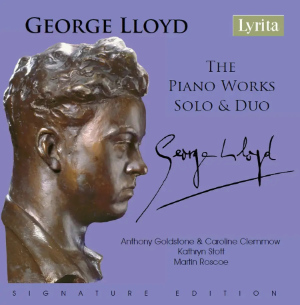
George Lloyd (1913-1998)
The Piano Works
Anthony Goldstone and Caroline Clemmow (piano duo)
Martin Roscoe (piano)
Kathryn Stott (piano: The Lily-Leaf, The Transformation)
rec. 1987, Henry Wood Hall and St Barnabas Church, North Finchley, London (solos); 1996, St John the Baptist Church, Alkborough, North Lincolnshire, UK (duos)
Lyrita SRCD2423 [2 CDs: 147]
Lyrita continues its ‘Signature Edition’ of reissues of George Lloyd’ s music, with a twofer of his piano music, either for solo or for piano duo. This isn’t the most well-known element of his oeuvre, and the piano wasn’t his instrument – the violin was – but he turned to it in the 1960s at the urging of his wife and was fortunate to find something of a muse in the shape of John Ogdon.
It was for Ogdon that he wrote An African Shrine (1966) a piece that opens ‘violente’ and stays quixotically dramatic for much of its length, which is effectively in one movement lasting 23 minutes. Its most evocative moments come in the beautifully voiced Lento section, richly chorded as it is and coursing with the noble beauty familiar, in particular, from his symphonic slow movements. The final section has a chorale-like theme coursing through it and, perhaps, a few saturnine Mussorgskian echoes as well.
Lloyd’s titles are the opposite of the merely functional. No sonatas, or sonatinas or suchlike. He preferred narrative, descriptive titles like The Aggressive Fishes – something to stir the imagination and to reward it with one of his most undilutedly impressionistic pieces. Similarly with St Antony and the Beggar with its rich variety of moods, aggressive, capricious and finally charming. There are two versions of The Road Through Samarkand, the first for solo piano and the second for piano duo. Martin Roscoe plays the solo version – as he does on An African Shrine and the other pieces just noted – with full awareness of the music’s variety of colour and vitality, sometimes amounting to a teeming riot of incident. This is amplified, if anything, in the duo version played by the elite team of Anthony Goldstone and Caroline Clemmow. Another work was Lullaby (Intercom Baby) – catchy title, again – which was originally written for violin and piano but recast for solo piano for the recording that was being made by Roscoe. It’s warm and leisurely except for a few interjections from the baby concerned, though I have a feeling that the title is more entertaining than the music, a rare confession from me when it comes to Lloyd.
The Transformation of that Naked Ape – note the ‘that’ not ‘the’ – as he derived the title from Desmond Morris’ book The Human Ape but disputed that that humans were simply superior animals. Thus, he anatomises a woman’s body – Hair, Tongue, Eyes, Brain, Mind, Soul – in a musical progression from the superficially physical to the spiritual. The darting clarity of ‘Her Eyes’ is ingeniously done, whilst ‘Her Brain’ is more plangent and ‘Her Mind’ slows romantically. Finally, ‘Her Soul’ is a full of vigour and sunshine, ending exultantly. One wonders whether Lloyd based all this on his wife or whether it was a more abstract conceit.
One of his biggest projects for piano duo was the symphonically-sized Aubade, 37-minutes long and cast in eight sections, all with typically Lloydian descriptive titles. March elements, impressionism, heightened romance, puckish phraseology, rich thematic material including chimes, a Moths movement that sounds uncannily like Rimsky’s Bee, and an uncomplicatedly extended finale; if this sounds your kind of thing then Aubade is your kind of work.
Eventide is a carol that went back to Lloyd’s youth – composed when he was ten, in fact – and which he had already used in his opera John Socman. It shows his great grasp of melodic distinction even at so young an age. Later, after this piano duo version he arranged it for brass band, in which form it has already appeared in this series. The Lily-Leaf and the Grasshopper is the first piano work of Lloyd’s I heard, and it’s played by Kathryn Stott, who also plays The Transformation of that Naked Ape, with a marvellously sympathetic awareness of its tunefulness and its spirit of romantic reverie.
The booklet notes are, once again, in the safest and most helpful of hands, namely Paul Conway.
Jonathan Woolf
Buying this recording via a link below generates revenue for MWI, which helps the site remain free


Contents
For Piano Duo
Aubade (1971)
Eventide (1989)
The Road Through Samarkand (1995)
For Solo Piano
The Lily-Leaf and the Grasshopper (1972)
The Transformation of that Naked Ape (1972)
Lullaby (Intercom Baby) (1987)
An African Shrine (1966)
The Aggressive Fishes (1972)
St Antony and the Beggar (1972)
The Road Through Samarkand (piano solo) (1972)

















